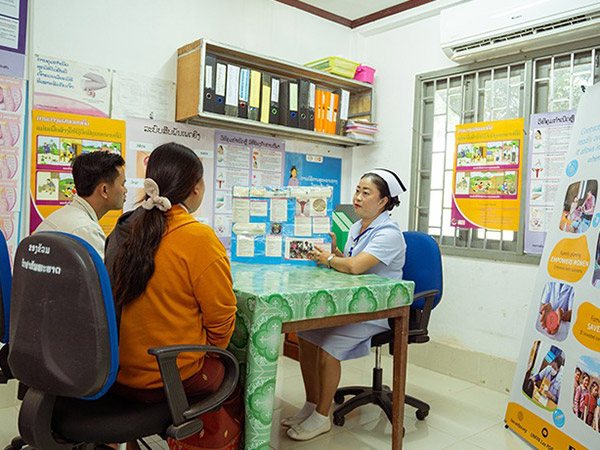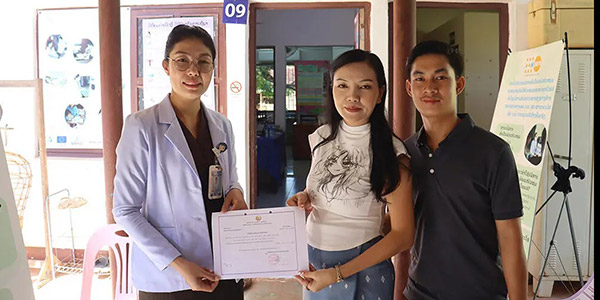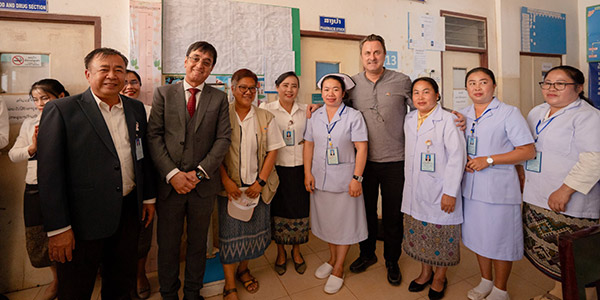 |
| The Keo-Oudom clinic, which has helped more than 500 couples since its establishment, is supported by UNFPA and funded by Luxembourg. © UNFPA Lao PDR/Khen Keovilay |
A love story with rights and choices in Laos
“We are lucky, as soul mates, to have found each other,” said 35-year-old Viengsamai of her new husband, Nouker, 24. But their story may not have been so fairytale-like had they not found the right information to plan their lives as they wished.
Thanks to the services they were offered at the Keo-Oudom Hospital in Vientiane province, Viengsamai said, “We are also lucky that we can safely plan for the future and master the correct information about contraception and our well-being.”
 |
| Ms Viengsamai and Mr Nouker found love in each other – and are lucky to have found support with their rights and choices at a UNFPA-supported clinic in Vientiane, Laos People’s Democratic Republic © UNFPA Lao PDR/Khen Keovilay |
The couple has benefited from a project supported by UNFPA, the UN sexual and reproductive health agency, that ensures referral pathways for couples to receive advice on their sexual and reproductive lives, family planning, contraception, and civil registration. The project is funded by the government of Luxembourg and was co-created by the Lao Ministries of Home Affairs and Health.
This week, a delegation from Luxembourg visited the clinic to witness first-hand the impact these services are having on the sexual and reproductive health and family planning of people in the country.
“The more we learn through couples’ counselling, the more empowered and confident we feel,” Nouker told Mr Xavier Bettel, Minister of Foreign Affairs of Luxembourg, and a delegation of parliamentarians.
“During today’s visit [to the clinic], I discovered long-acting contraception methods, which my wife and I might consider after our first child. We also learned about nutrition and necessary check-ups during pregnancy.”
“The best investment a country can make is in its people, including in the well-being, health, and empowerment of women and girls,” said Mr Bettel.
“Ensuring access to sexual and reproductive health services and rights is fundamental to achieving gender equality and laying the foundation for sustainable development. This is why Luxembourg has been a long-time supporter of strengthening Lao health systems together with UNFPA,” he added.
The Lao couple was grateful to Luxembourg for their support of the project and underlined the importance of innovative approaches, such as telehealth and mobile outreach, in ensuring couples and young people receive the family planning and sexual and reproductive health information and support they need.
“Many young people can’t get to a health facility, so the services must go to them. Already many [couples] in unions do not know about contraception or about their bodies and minds. They should be able to benefit as we did,” said Nouker.
UNFPA Representative to the Lao People’s Democratic Republic Dr Bakhtiyor Kadyrov, said, “Couples’ counselling not only empowers couples to choose and decide freely and responsibly the number, spacing, and timing of their children, but also focuses on reinforcing their communications, problem-solving and conflict resolution skills, and values such as mutual support, respect and zero tolerance to violence.”
 |
| Mr Xavier Bettel, Minister of Foreign Affairs of Luxembourg, visited the Keo-Oudom clinic. “The best investment a country can make is in its people, including in the well-being, health, and empowerment of women and girls,” he said. © UNFPA Lao PDR/Khen Keovilay |
Since the beginning of 2023, more than 500 couples like Viengsamai and Nouker have benefitted from non-discriminatory, confidential counselling. The programme was pilot tested in Vientiane province, and is now being expanded to 14 other provinces, leveraging further resources with support from partners such as the Korea International Cooperation Agency (KOICA), the Korea Foundation for International Healthcare (KOFIH), and JSI.
In the last decade, thanks to the commitments of the Lao Government and the support from UNFPA and key donors such as Luxembourg, sexual, reproductive and maternal health have improved, health services are stronger, commodities are more available, and investments in capacity-building for health providers and midwives have helped change attitudes to sexual and reproductive health.
As a result, the percentage of people satisfied with modern contraception rose from just over 60 per cent in 2011 to nearly 75 per cent in 2023, while those receiving at least four antenatal visits from a health provider nearly doubled from 37 per cent in 2011 to over 71 per cent in 2023.
“We are a different generation from our parents,” added Viengsamai. “Now we know that contraception exists, and we expect these services to be provided. In the past, our parents had up to eight children – it was difficult for them to offer a decent life to all their children, to invest in their education, nutrition, well-being and futures.”
Luxembourg continues to be a valued supporter of UNFPA’s impactful work in Laos as well as globally, investing in flexible core resources where they are needed most.
This article is contributed by UNFPA Laos
(Latest Update February 14, 2024)
|




